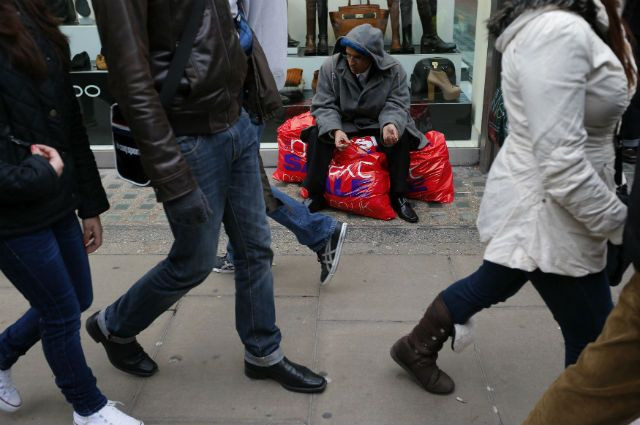
Tentative signs the euro zone may have passed the worst of its downturn emerged in December but business surveys also suggested Britain's economy tipped back into contraction in the final months of 2012.
Friday's purchasing managers indexes, which measure the activity of thousands of companies worldwide, brought mixed news from Europe.
Activity in Britain's dominant services sector fell for the first time in two years and at a faster pace than predicted by any analyst polled by Reuters, while the speed of decline among French, Italian and Spanish firms slowed.
Data from the United States due later on Friday are expected to show continued but modest jobs growth and a steady expansion of its services sector.
With Chinese growth showing evidence of revival, that leaves Europe as the world's economic slowcoach going into 2013.
In particular, economists were surprised by news the UK services PMI slipped to 48.9 in December from 50.2 last month, sagging below the 50 mark that divides from contraction for the first time in two years.
"The PMIs point to an economy that is contracting modestly," said Rob Wood, chief UK economist at Berenberg Bank.
"The broader picture is that for some time the economy has been bouncing around the bottom ... and I think this is likely to stay with us for the next couple of quarters."
Survey compiler Markit said the figures suggest Britain's economy shrank 0.2 percent in the final quarter of 2012, a slightly bigger drop than most other private-sector forecasts.
The euro zone composite PMI hit its highest levels since last March, rising to 47.2 in December from 46.5 in November, although it remained rooted below the 50 mark for an 11th month.
"I think (the euro zone PMIs) are showing a decisive bottoming-out of activity," said James Nixon, chief European economist at Societe Generale.
"Now, the actual levels of the surveys are still consistent with GDP declining, but at least things aren't getting worse any faster."
WORST OVER?
The decline eased among the services firms that make up the bulk of the euro zone's economy, ranging from banks to restaurants, but manufacturers endured an awful end to 2012.
Survey compiler Markit warned that Friday's figures would probably fail to prevent the euro zone's recession deepening in the fourth quarter of last year, thanks to dismal figures in October and November.
"The surveys at least bring some substance to the belief that the worst is over and that a return to growth is in sight for the region in 2013," said Chris Williamson, chief economist at Markit.
As with last year, the euro zone economy's fate hinges on the resolution of the sovereign debt crisis, which still smoulders despite the creation of financial firewalls by the European Central Bank and European Union.
German Finance Minister Wolfgang Schaeuble said last week he thought the worst had passed for the debt crisis, although similar sentiments have been expressed by various European policymakers and politicians since mid-2010.
Friday's European data followed news that China's services sector saw its slowest rate of expansion in nearly a year and a half in December, although the HSBC services PMI still pointed to a modest revival in economic growth.
And economists expect the U.S. ISM non-manufacturing survey, another PMI, to fall slightly to 54.2 in December from November's 54.7. While showing slowing growth, that would still signal a far brighter economic outlook for the U.S. compared with its European peers.
Analysts also predict the U.S. economy added around 150,000 non-farm jobs in December, compared with 146,000 the previous month.
© Thomson Reuters.




